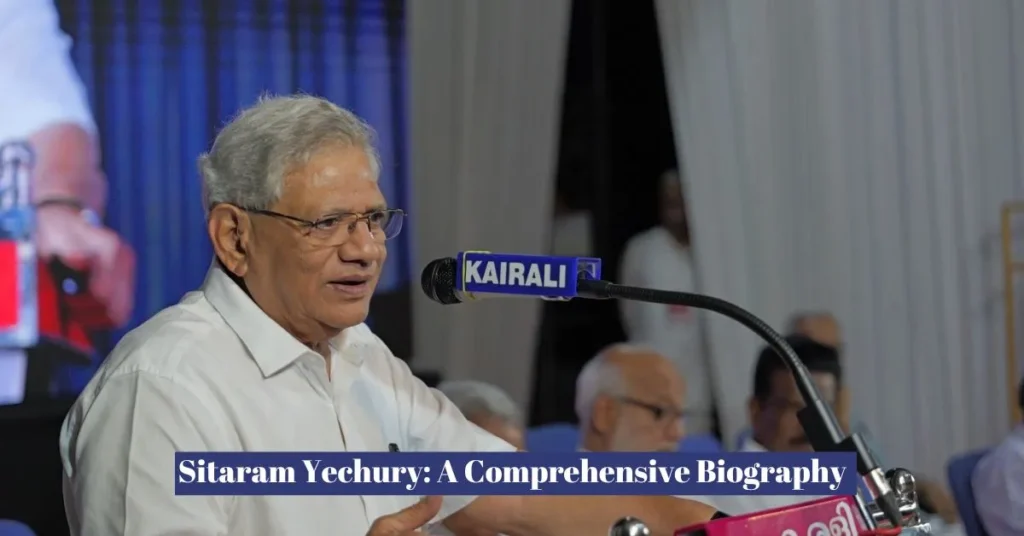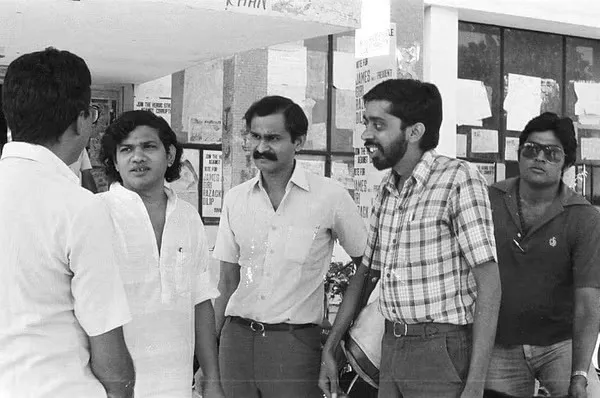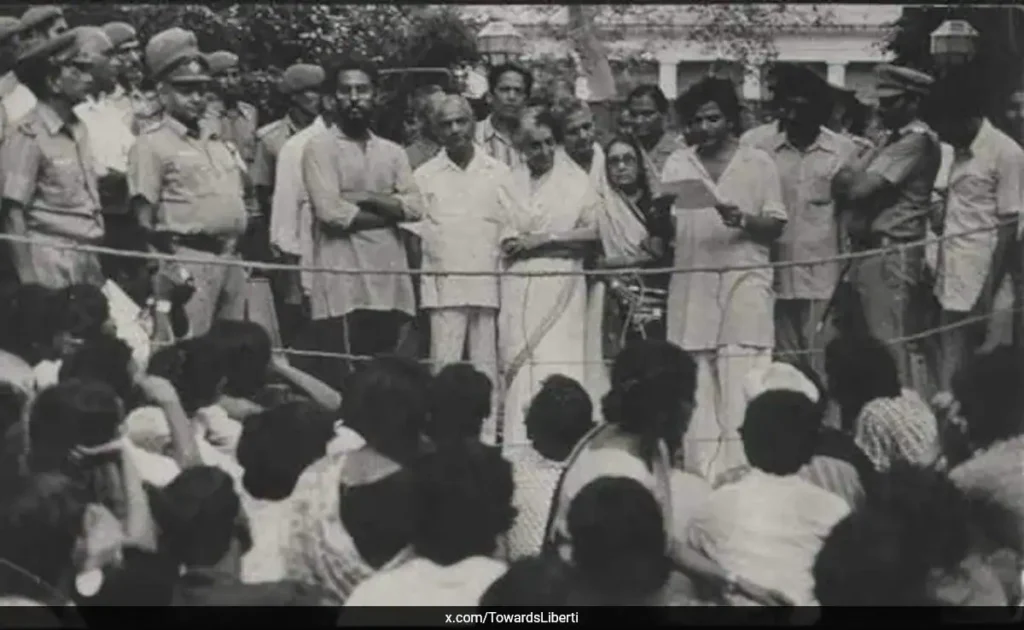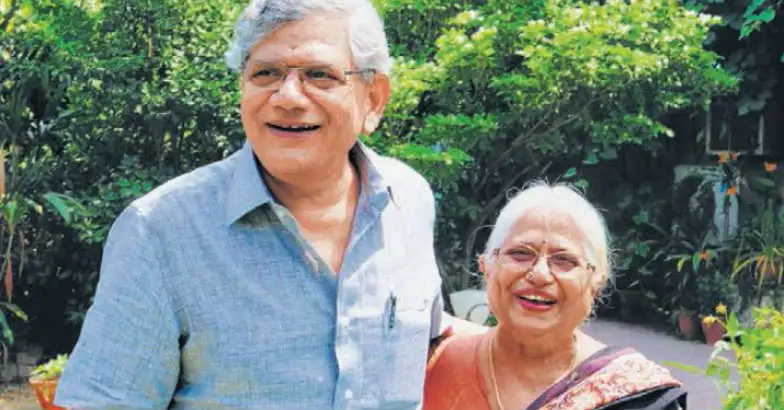Sitaram Yechury, a prominent Indian politician and the current General Secretary of the Communist Party of India (Marxist) [CPI(M)], has been a key figure in Indian politics for several decades. Known for his intellectual prowess, eloquence, and staunch advocacy for leftist ideologies, Yechury has shaped contemporary political discourse in India. This detailed biography explores various aspects of his life, including his education, family, political journey, challenges, and his international influence.

Early Life and Education
Sitaram Yechury was born on August 12, 1952, in Chennai, Tamil Nadu, to a middle-class Telugu-speaking family. His father, Kameshwar Rao Yechury, was an engineer with a strong inclination toward academic excellence, while his mother, Kalpakam Yechury, was a homemaker. Though born in Chennai, he spent much of his early life in Delhi, where he moved with his family.
Education
Sitaram Yechury ‘s academic journey is a reflection of his sharp intellect and deep interest in social issues. He completed his schooling from All India Senior Secondary School, New Delhi, before enrolling at the prestigious St. Stephen’s College, Delhi University, where he pursued a Bachelor’s degree in Economics (Hons.).
After completing his undergraduate degree, Yechury went on to pursue a Master’s degree in Economics from Jawaharlal Nehru University (JNU), where his deep political consciousness was shaped. His time at JNU was instrumental in his political awakening, as the campus was a hub of leftist thought and activism during the 1970s. His involvement in student politics began here, where he quickly rose to prominence as a student leader.

Political Career and Rise in the CPI(M)
Sitaram Yechury’s formal entry into politics came through the Students’ Federation of India (SFI), the student wing of CPI(M), while he was at JNU. He became an integral part of student movements advocating for workers’ rights, secularism, and democracy. His sharp oratory skills and clear ideological stance made him a natural leader.
In 1975, during the period of Emergency imposed by Prime Minister Indira Gandhi, Yechury was arrested and imprisoned for his opposition to the government’s authoritarian rule. His resistance during this time cemented his status as a strong and fearless advocate of democratic rights and freedoms.

Rise in the Ranks of CPI(M)
After being an active part of SFI, Sitaram Yechury’s influence grew within CPI(M). He officially joined the Communist Party of India (Marxist) in the early 1970s and steadily climbed the party ranks. By 1984, Yechury was elected to the Central Committee of the party. His intellectual leadership was evident in the role he played in shaping the party’s stance on various issues, especially on economic and foreign policies.
Sitaram Yechury was elected to the CPI(M) Politburo, the party’s highest decision-making body, in 1992, at a relatively young age. His rise within the party was marked by his ability to present a balanced approach between ideological purity and pragmatic politics.
In 2015, after the retirement of Prakash Karat, Yechury was unanimously elected as the General Secretary of CPI(M) during the party’s 21st Congress in Vishakhapatnam. His leadership came at a critical juncture when the Left’s influence in Indian politics was waning, particularly in states like West Bengal and Kerala, where it had traditionally been strong.
Role in Major Movements
Throughout his political career, Sitaram Yechury has played a critical role in numerous significant political and social movements. He was deeply involved in struggles for land reforms, advocating for farmers’ rights and pushing for the redistribution of land to the rural poor. Yechury has also championed labor rights, participating in protests and strikes demanding better working conditions and wages for industrial and agricultural workers.
Additionally, he has been an outspoken critic of globalization and neoliberal policies, particularly regarding their impact on the working class and marginalized communities in India. His efforts to resist policies like economic liberalization and privatization were central to CPI(M)’s strategy during his rise in the party.
Challenges During His Tenure
Yechury became General Secretary of CPI(M) at a time when the party faced significant challenges. In West Bengal, once a stronghold of CPI(M), the party’s influence declined after losing power to the Trinamool Congress. Similarly, electoral setbacks in Kerala posed further challenges.
Yechury has had to navigate internal divisions within the party, with differing opinions on how to address the rise of right-wing politics in India. His leadership has been a balancing act, trying to unite the Left Front while attempting to form alliances with other opposition parties.
Sitaram Yechury’s Political Ideology
Sitaram Yechury is a staunch advocate of Marxist-Leninist principles and has consistently championed the cause of the working class, marginalized communities, and secularism. His political thought is rooted in the ideals of socialism, with a focus on reducing economic disparities, ensuring workers’ rights, and promoting social justice. He has also been a vocal critic of neoliberal economic policies and communalism in Indian politics.
Parliamentary Career
Yechury has served multiple terms as a Member of Parliament (Rajya Sabha), representing the state of West Bengal. During his time in Parliament, he has been an articulate and prominent voice of the opposition, known for his clear analysis of economic and social issues. His speeches, often peppered with historical references and sharp critiques, have made him a respected figure across party lines.
International Influence
Sitaram Yechury’s engagement extends beyond national boundaries. He has been involved in various international socialist movements and has spoken at global platforms advocating for anti-imperialism, worker solidarity, and economic justice. His criticism of global capitalism and neoliberalism aligns with CPI(M)’s larger ideological framework.
Yechury’s international interactions have often focused on South-South cooperation, promoting solidarity among developing nations to counter the dominance of Western economic models. His efforts to advocate for global socialism make him an influential figure in international leftist movements.
Personal Life and Family
Sitaram Yechury married Seema Chisti, a journalist and editor. They share a life rooted in progressive ideals. Together, they had a son, Ashish Yechury, who tragically passed away in 2021 due to complications from COVID-19, a personal loss that deeply affected Yechury.

Yechury has maintained a relatively low-key personal life, focusing much of his energy on his political career and activism. His family has largely stayed out of the political spotlight, with Yechury himself being known for his humility and grounded nature despite his prominent public role.
Sitaram Yechury’s Net Worth
As of recent reports, Sitaram Yechury’s net worth is modest compared to many contemporary politicians. Yechury, like many in the CPI(M), has adhered to a lifestyle in line with the party’s principles of modesty and simple living. His assets primarily include his personal savings and property, with no significant accumulation of wealth or luxury, consistent with his ideology of equality and social justice.
Views on Contemporary Issues
Yechury has continued to express strong opinions on contemporary issues such as:
- Digital Economy: He has been critical of how the digital economy disproportionately benefits large corporations while leaving out millions of informal workers.
- Climate Change: Yechury advocates for environmental justice, emphasizing that the brunt of climate change falls on the poor and marginalized communities.
- India’s Relations with Neighbors: He supports fostering peace and cooperation with countries like Pakistan and China, advocating for diplomatic dialogue rather than conflict.
Sitaram Yechury’s Historical Impact
Throughout his career, Yechury has made significant contributions to the Indian Left and broader national politics. His involvement in critical movements and his leadership within CPI(M) have helped shape the party’s position on several issues, from resisting communalism to advocating for the rights of laborers and farmers. While the Left’s electoral fortunes have declined, Yechury’s intellectual leadership continues to inspire many.
His efforts to unite opposition parties against the growing influence of right-wing politics have also been notable. He remains one of the few figures capable of bridging ideological differences within the fragmented opposition, advocating for a united front against policies he views as detrimental to India’s secular fabric and social equity.
Conclusion
Sitaram Yechury has emerged as one of the most prominent figures in India’s political landscape, representing a voice of reason, secularism, and social justice. From his days as a student leader in JNU to his current position as the General Secretary of CPI(M), Yechury has consistently advocated for the working class and marginalized communities. His political journey is marked by a deep commitment to socialist ideals and a tireless dedication to the cause of a more equitable society.
For those interested in the intricacies of Indian politics, Sitaram Yechury remains a figure of considerable importance, balancing ideology with the realities of modern governance and opposition politics.